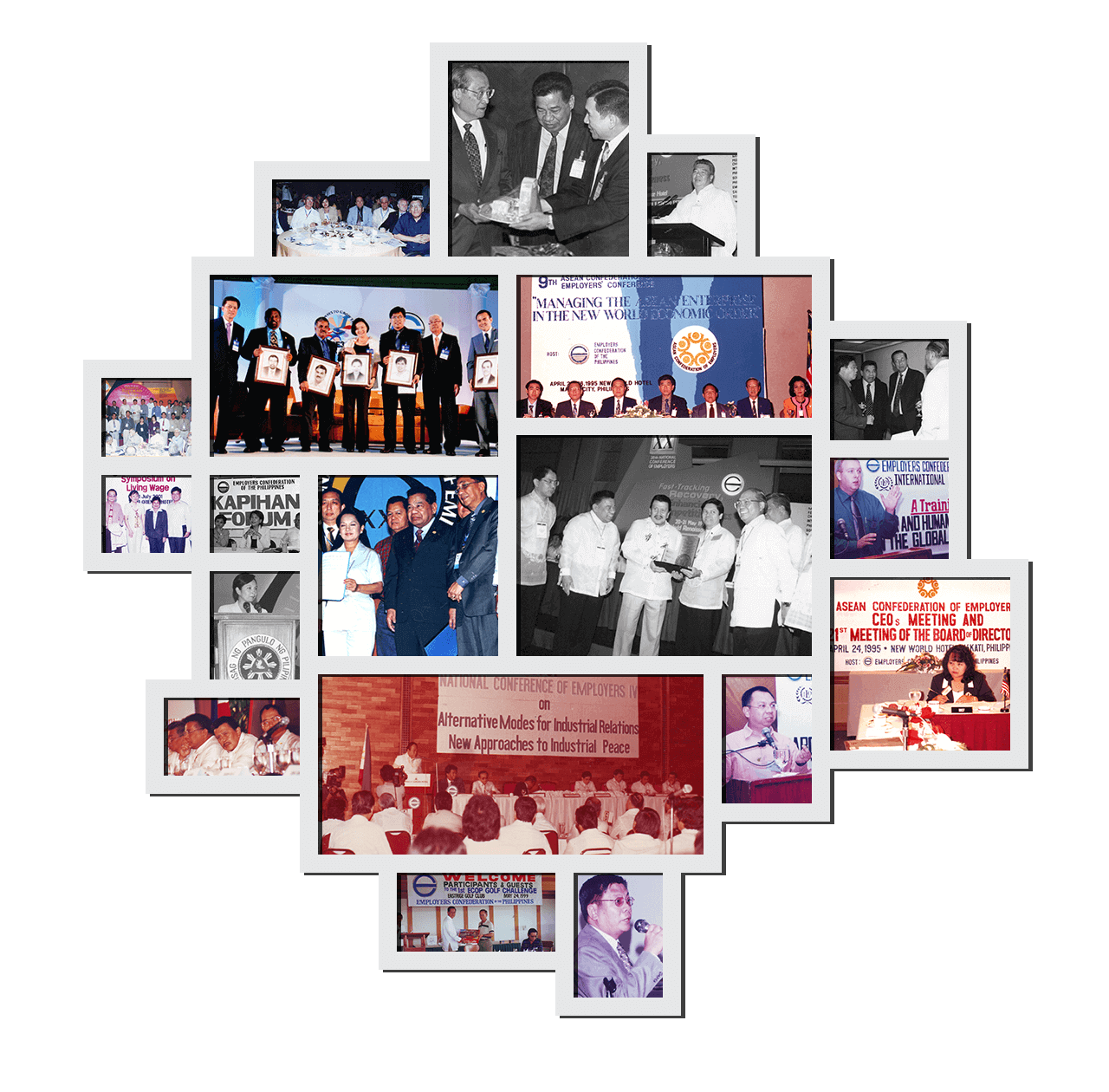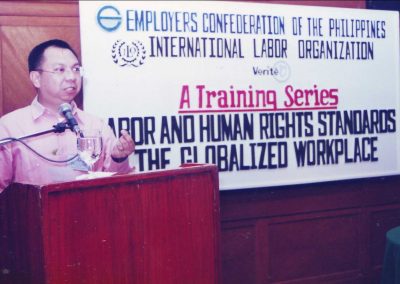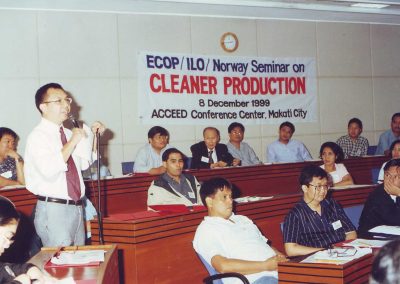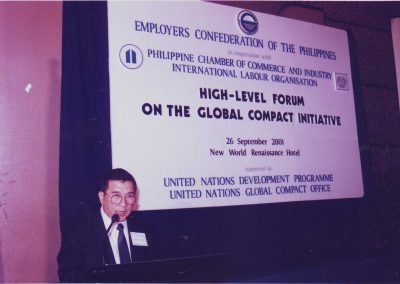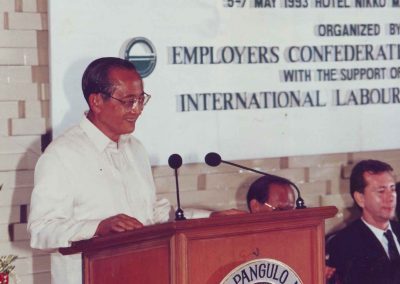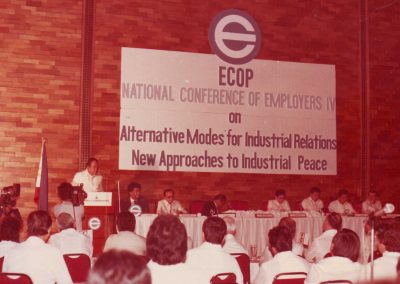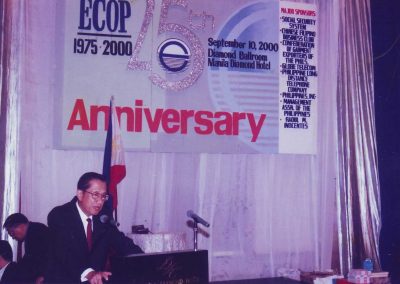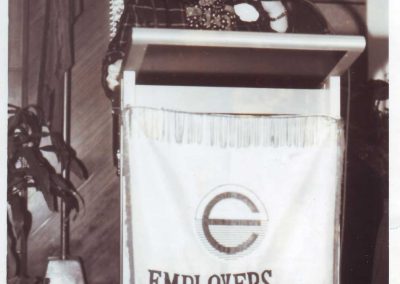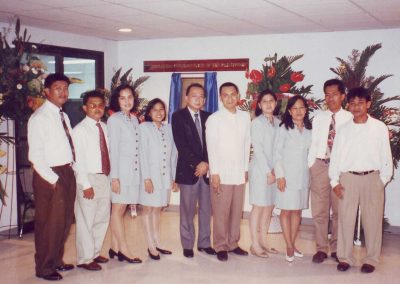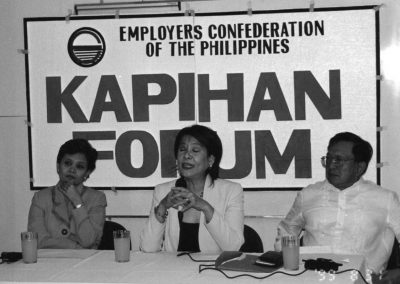About the Employers Confederation of the Philippines
The voice of Philippine employers on labor and social policy towards the pursuit of national development.
Vision
Mission
- To advance the employers’ interests on all labor, social, and employment issues through proactive engagement at the national, regional, and international levels;
- To promote industrial peace through tripartism and social dialogue;
- To contribute in shaping an environment conducive to investment and employment generation through participation in decision and policy making bodies;
- To foster sustainable business through ethical management standards and good employment practices.
Objective
Membership
Governance
The ECOP Board of Governors, which consists of fifteen (15) members, is the highest policy-making body of the organization. The Governors are elected for a two-year term subject to re-election. They choose from among themselves the officers of the organization, led by the President, who serves for a one-year term subject also to re-election. The policies and directives formulated by the Board are implemented by the ECOP Secretariat which is headed by a Director General assisted by a Deputy Director-General.
A Brief History
The beginnings of ECOP.
SEP 1975
ECOP acquired its legal personality on September 10, 1975 upon issuance of a certificate of registration by the Securities and Exchange Commission
Three years into martial law on September 10, 1975, the Securities and Exchange Commission (SEC) issued a certificate of registration to the Employers Confederation of the Philippines (ECOP). It was the start of its legal personality, and its long and arduous road towards becoming the “single voice” of the entire business community on important national issues that involved labor and social policies.
Its specific objectives are as follows: (1) to represent and enhance employer interests and to formulate and recommend policy proposals on all issues affecting labor-management relations, as well as other social and economic policy questions before governmental agencies or instrumentalities and/or regional or international for a; (2) to enhance professional and ethical management practices and standards for effective and harmonious labor-management relations; and (3) to encourage and ensure the success of a tripartite consultation machinery to the end that workers, employers and government worked harmoniously and effectively towards greater productivity and national progress.
Prior to the incorporation of ECOP, the employers of the country were represented by many organizations, and among these were the Chamber of Commerce of the Philippines (CCP) and the Philippine Chamber of Industries (PCI). These chambers had their own labor committees that responded to the concerns of their respective members on labor issues. These issues ranged from labor’s recurring demands for increase in the minimum wage and for restoration of labor’s right to strike.
Emerging from their experience in tripartite meetings with labor and government and their interaction in numerous international fora, the leadership of the CCP and PCI came to the realization that only a united organization could provide a counterpoint to the dominance of organized labor. This led to the group’s undertaking of joint positions on the burning issues of the day affecting labor-management relations. And inspired by then Labor Minister Blas F. Ople to form a consolidated employers’ organization, the two business chambers formed an organizing committee to achieve unification.
The tantalizing idea of unification among the various business organizations spawned several meetings among the Philippine Council of Management (PHILCOMAN), the Personnel Management Association of the Philippines (PMAP), the Chamber of Mines, the Bankers Association of the Philippines (BAP), the Philippine Contractors Association (PCA), the Chamber of Agriculture and Natural Resources (CNAR) and the Federation of Filipino-Chinese Chambers of Commerce and Industry, Inc. (FFCCCII). It was also a race to forge a solid front so that a single voice will be heard in the drafting of the Labor Code of the Philippines, which was finally promulgated on May 1, 1974.
So it was on September 10, 1975 that ECOP came into existence. The following were the founding members: Fred J. Elizalde, Aurelio Periquet, Jr., Raul Boncan, Miguel B. Varela, Edgardo Villavicencio, Alfredo Montelibano, Benildo G. Hernandez, Rafael K. Hernaez, Emmanuel Balcruz, Raoul M. Inocentes, Wilfrido Tecson, Alberto de Villa Abrille, Onofre Banzon, Yao Shiong Shio, and Orlando Pena.
MAY 1978
ECOP is recognized as the single voice of employers organizations to be consulted by government, together with organized labor.
On May 1, 1978, the government through Letter of Instruction No. 688, recognized ECOP as the single voice of employers organizations to be consulted by government, together with organized labor, in the promulgation of a scheme which would promote an adequate machinery for cooperation between workers and employers.
It was the beginning of true
The ensuing years saw the foreign chambers and the major industry associations join and make common cause with ECOP in all its objectives and programs of action. These included the American Chamber of Commerce of the Philippines, Japanese Chamber of Commerce and Industry of the Philippines and the Australia-New Zealand Chamber.
Among the industry groups affiliated with ECOP are the following:
- Garment Business Association of the Philippines,
- Philippine Exporters Confederation, Inc.,
- Textile Mills Association of the Philippines,
- Semiconductor Electronics Industry Foundation, Inc.,
- Philippine Retailers Association,
- Pharmaceutical and Healthcare Association of the Philippines,
- Export Processing Zone Chamber of Exporters and Manufacturers,
- Philippine Hospital Association,
- Chamber of Furniture Industries,
- Hotel and Restaurant Association of the Philippines,
- Philippine Association of Local Service Contractors,
- Philippine Sugar Association and
- Provincial Bus Operators Association of the Philippines.
